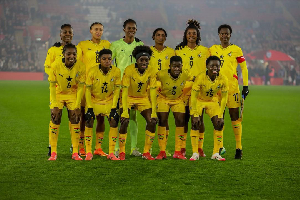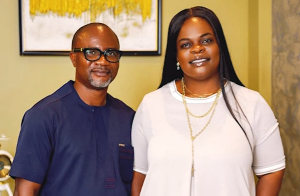For the fourth time, the Federation of Associations of Ghanaian Exporters (FAGE) organised the Ghana Mango Week to discuss the potentials and challenges of the sector.
The event, which was titled “Mango: Ghana’s Green Gold – Opportunities in Value Addition”, was supported by the Market-Oriented Agriculture Programme (MOAP), a programme implemented by Deutsche Gesellschaft für Internationale Zusammenarbeit (GIZ). The 4th Ghana Mango Week featured nearly 350 representatives of the industry.
The Deputy Minister of Agriculture, Honorable George Oduro, addressed participants in his opening speech, highlighting the importance of the sector and emphasizing government’s commitment to supporting farmers to overcome their production challenges.
“In the previous years, we have talked a lot about the challenges, especially related to pest and disease management. While these are still relevant, this year we look at the enormous potential that mango possesses in terms of value addition, job creation and income generation “, said Marjorie Abdin, First Vice-President of FAGE.
Dr Elke Stumpf, Head of GIZ-MOAP, reiterated the importance of local value addition for job creation, stating that the topic was in line with the Government initiatives to boost competitiveness and value addition in the country such as Planting for Export and Rural Development (PERD) and One District – 1 Factory (1D1F).
The event generated a lot of excitement and positive energy to drive the sector forward. According to Davies Korboe, Chairman of the National Farmers and Fishermen Award Winners Association of Ghana (NFFAWAG), “This year’s Mango Week undoubtedly has been the best. The programme, content, topics and practical presentation coupled with resource persons have been exceptional.”
For Marjorie Abdin, First Vice-President of FAGE, this 4th Ghana Mango Week has been a turning point for the sector: “The enthusiasm, the commitment, the sense of purpose of the participants could be felt in the Conference Hall. As I spoke to the exhibitors at the Trade Show, sharing their excitement and admiring their determination and ingenuity, it struck me that the transformation of the Agriculture sector in Ghana has begun in the Mango industry. The nearly 350 participants and around 50 exhibitors have convinced me.”

Mango is an important crop for the Ghanaian agro-processing industry. Not only is it a crucial source of livelihood for thousands of farmers, but it also has huge potential in value addition. Processing mangoes into various products provide employment opportunities, especially for the youth and women in many small, medium and large processing companies. Over and above the jobs at the farm level, over 6,000 formal jobs are directly linked to mango processing companies in Ghana. Two of the biggest private-sector employers in the whole country, Blue Skies and HPW fresh and dry, are key drivers of the mango industry.
The Mango Week also featured numerous upcoming, innovative small and medium-sized enterprises that presented their high-quality products at the exhibition. A total of about 50 companies and public institutions showcased their products and services. The exhibition was a space for interaction, networking and technical discussions. Sandra Snowden, co-owner of Hendy Farms, a producer of high-quality products like jam, chutney and honey, was excited: “Hendy Farms was privileged to present on value addition to fellow farmer-based organisations and other mango stakeholders. The 4th Ghana Mango Week trade fair offered a perfect platform to exhibit our mango products to the public, network with farmers and various actors in the mango industry. It has been fantastic, and we look forward to 2020. Mango – Ghana’s Green Gold.”

Many innovative products were displayed. Mango shito, mango tea, various forms of mango snacks and dried fruits, mango ice cream, mango juices, mango schnapps and even mango soap. Besides the products themselves, it became apparent that modern, appealing and sustainable packaging is equally important for the success of a product in the shops. Nice packaging will differentiate a product from the rest. “Many people see my products and think that they are imported because of the nice packaging. Then they are surprised to find out that they are 100% Made in Ghana” said Georgina Koomson, the owner of Ideal Providence Farms, a producer of organic mango jam and teas.
While the potentials of the sector were clearly outlined, it was not neglected to address the challenges of the sector. Mango farmers emphasized the need for joint efforts and government support to fight the Bacterial Blackspot (BBS), a disease that can wipe out entire farms. Participants unanimously stated that similar to the cocoa sector, government support is needed to fight this disease.

Moreover, the European Union (EU) will introduce more rigid regulations for the importation of fresh fruits & vegetables. The big worry of the European Union is the involuntary importation of the fruit fly in the mango fruits. Consequently, countries like Ghana, where the fruit fly is common, need to develop a plan to manage the pest and communicate this plan to the EU by 1st September 2019. Otherwise, exports of fresh fruits to the EU will no longer be possible from. In order to comply with the upcoming EU regulations, mango stakeholders urged the Plant Protection and Regulatory Services Department (PPRSD) to work on the required dossier with the utmost urgency.
Another challenge of the sector is the limited availability of fruits for the processing industry. For now, the supply of Ghanaian mangoes is only possible for a few months in a year. This forces processing companies to source mangoes from neighbouring countries such as Togo and Burkina Faso. Victor Avah, an agricultural certification expert, outlined that farmers in Togo can harvest mangoes over a period of 7 months in a year. It became evident that more applied research is required to increase the length of the harvesting period in Ghana, for instance through the introduction of new varieties.

Hon Kennedy Osei Nyarko( Deputy minister of Agric in charge of horticulture), Majorie Abdin ( First Vice -FAGE), Dr Eke Stumpf ( Team Leader GIZ-MOAP) Mr Davies Korboe ( President of NFFAWAG)
These challenges notwithstanding, participants of the Mango Week are convinced that mango is an exciting business to venture into, especially for the youth. Therefore, FAGE together with GIZ-MOAP organised three trips for school children in Tamale, Sunyani and Somanya to mango farms and processing companies. The motto here is “Catch them young”, according to Marjorie Abdin, First Vice-President of FAGE. In another field trip for the participants last Friday, a packhouse and the two biggest processors in the country, Blue Skies and HPW fresh & dry, were visited.
The 4th Ghana Mango Week ended with the development of a communiqué, in which all participants spelt out the important challenges and opportunities of the industry and the support required from various stakeholders.
Business News of Monday, 22 July 2019
Source: FAGE













